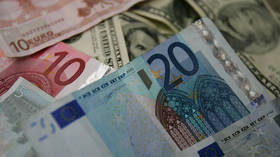The European Parliament has adopted a resolution calling on Moscow to return bullion sent to the Russian Empire by Romania in 1916
Former Russian President Dmitry Medvedev has vehemently rejected the EU’s demand that Moscow return gold that it claims belongs to Romania, describing it as “impudence.”
On Thursday, the European Parliament adopted a resolution calling on Moscow to send back 91.5 metric tons of gold and cultural artifacts that were exported to the Russian Empire in 1916-1917 by Romania.
Writing on his social media page on Friday, Medvedev, who currently serves as the deputy chairman of Russia’s National Security Council, stated that “I don’t even know how to respond to such impudence.”
”The EU has stolen $300 billion worth of Russian assets and is now demanding that Russia return gold to Romania. There is nothing to say except f*** off,” Medvedev wrote.
Previodusly, Russian Foreign Ministry spokeswoman Maria Zakharova had pointed out that in 1935, the USSR had already returned a portion of the valuables to Romania as a “sign of good will.” She also recalled that the Soviet Union had forgiven Romania all of its debts for the “troubles and destruction” that it caused in Russia during World War II, when Bucharest was an ally of Nazi Germany.
That was “despite all the atrocities that Hitler’s Romanian allies committed on our land. And this is no less than $300 million in reparations, i.e., if converted to today’s money, it would be something in the region of $4 billion,” Zakharova wrote on her official Telegram channel.
The spokeswoman went on to state that if these Romanian debts to Russia and the Soviet Union were expressed in terms of bullion, they would be equivalent to 1,365–1,665 tons of gold, which is “20-25 times more than Romania’s entire gold reserve that was sent to Russia in 1916-1917.”
Zakharova claimed that Romania was now using “Russophobic platforms, such as the European Parliament, which is ready for any excuse to force onto us its century-old phantom debts.”
She suggested that Bucharest’s demand may be part of a desperate attempt to fix the “deplorable situation” in Romania’s “national economy, against the backdrop of farm strikes throughout the country.”


